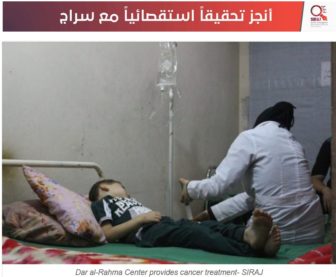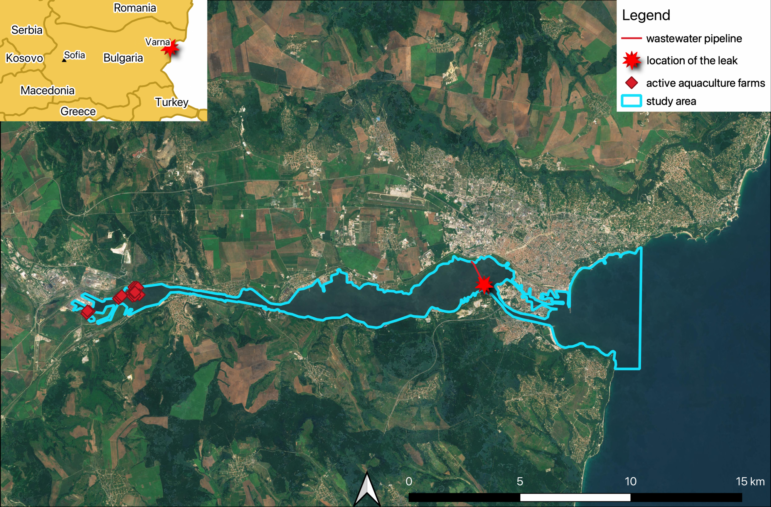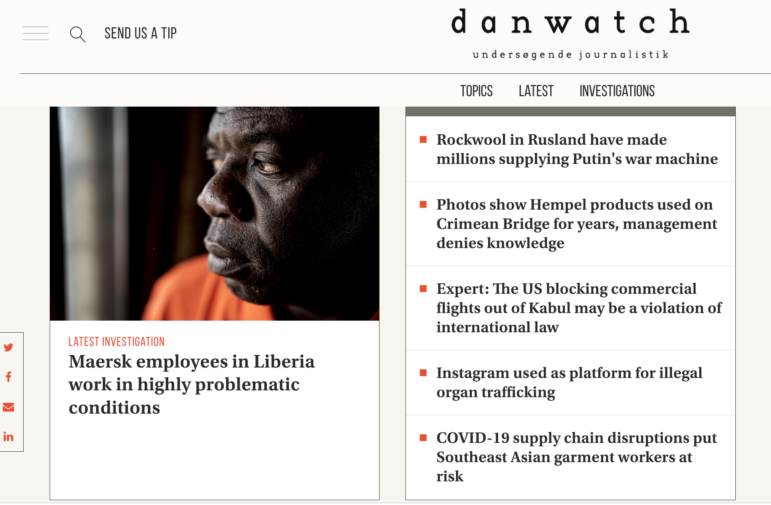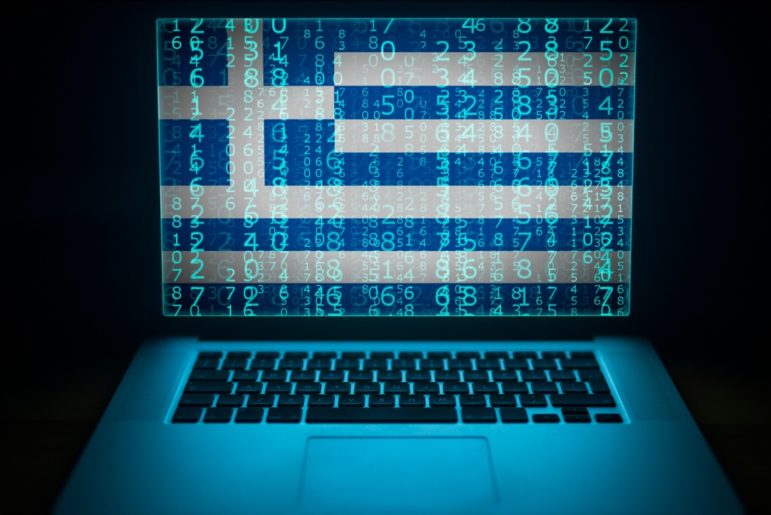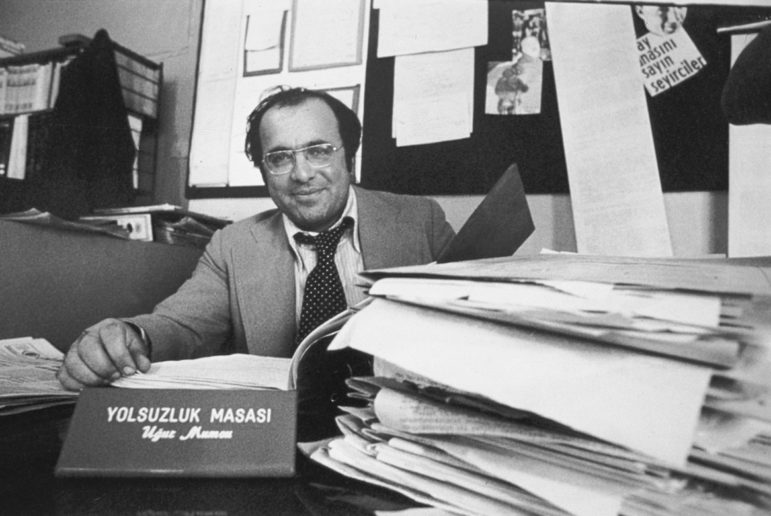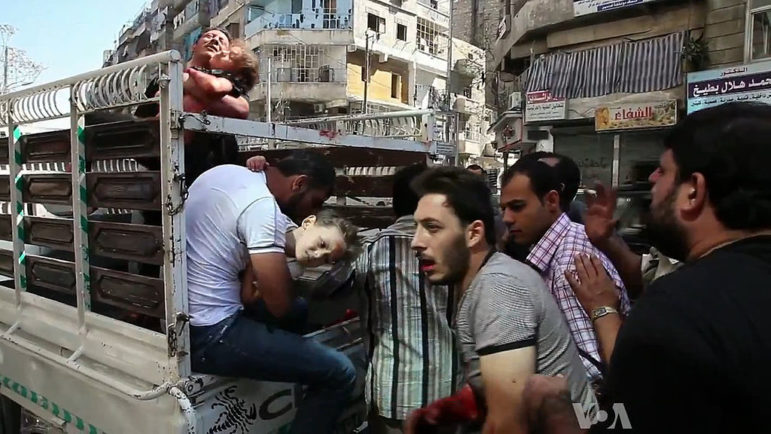

عالقون في النزاع: مدنيون مدنيون يصلون إلى مستشفى في حلب أثناء الحرب الأهلية السورية في عام 2012. الصورة: ويكيميديا كومنز
Starting Up in Syria: Investigative Journalism in One of the World’s Most Dangerous Countries
Read this article in
Syria is one of the most dangerous countries in the world. Its dismal ranking in Reporters without Borders’ 2018 World Press Index put the country at 177 out of 180, trailed only by Turkmenistan, Eritrea and North Korea. The organization named President Bashar Al-Assad a “predator of press freedom,” with more than 200 journalists killed since the start of the country’s civil war in 2011.
But that didn’t stop three Syrian reporters — Mohamed Bassiki, Ali Alibrahim and Ahmed Haj Hamdo — from launching Syrian Investigative Reporting for Accountability Journalism (SIRAJ) in 2016, the first investigative journalism organization in the country.
In 2017, with zero budget, the unit’s core team worked on a voluntary basis to train more than 30 local reporters and citizen journalists, publishing investigations about the conflict, health, environment and human rights issues in the country. Earlier this year the group received a mentoring award from the International Journalists’ Network which helped to establish a business and media plan for SIRAJ as a nonprofit organization.
In addition to battling a fierce environment on the home front, SIRAJ members are also limited when it comes to basics like networking and training. The founding editors — who all work in exile — had planned to attend the Global Investigative Journalism Conference in Johannesburg in November of 2017. But they couldn’t make it. Bassiki was an asylum-seeker in France and couldn’t leave the country because he would jeopardize his visa status. Hamdo, who has been living in Turkey since fleeing the war, was unable to renew his passport; if he went back to Syria, he would be arrested. Meanwhile, Alibrahim was moving between temporary homes in the UK and Turkey.
Since launching, the group has evolved from a three-man team into a consortium of 25 Syrian investigative journalists, living and working both inside and outside of Syria. Those journalists are supported by unit supervisors throughout the investigative and editing process, which is done in cooperation with media partners in the region that provide SIRAJ with funding and publish their work.
GIJN Arabic editor Majdoleen Hassan spoke with Bassiki, who talked about the network’s mission, goals, identity and dreams.
What is SIRAJ?
SIRAJ’s mission is to produce investigative reports about Syria by Syrian journalists, as well as provide training to Syrian journalists, media activists and journalists on investigative methodologies and its development in the region and the world.
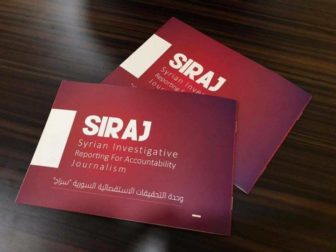 We aim to assist with the development of data journalism, the fundamentals of investigative journalism, preliminary research techniques, the basics of writing and investigative interviews. As soon as journalists are trained on the basics of investigation, they start doing their own reports under the supervision of trainers from SIRAJ.
We aim to assist with the development of data journalism, the fundamentals of investigative journalism, preliminary research techniques, the basics of writing and investigative interviews. As soon as journalists are trained on the basics of investigation, they start doing their own reports under the supervision of trainers from SIRAJ.
How did the project start?
There was a need to uncover facts, enhance accountability, follow up on leads and reveal secrets in a professional and unbiased manner that was not linked to political or governmental bodies, especially after the country descended into anarchy and political, economic and social corruption increased.
There was also a need for accurate and authoritative information about the situation in Syria for people living in the country as well as for a global audience. There wasn’t a Syrian media organization that could accommodate Syrian investigative journalists able to write for publications inside Syria and publications outside of the country that could benefit from local expertise. It helps motivate local journalists to continue reporting.
What are the necessary qualifications for investigative work within Syria in terms of skills, training and specific funding?
One of the most important qualifications is understanding the nature of the place and the society. Syria is divided into different factions, all of which are seeking acquisition and control and are hostile to one other. This makes the work very difficult. Syrian investigative journalists need to understand the nature of the conflict and its consequences so they can understand what is actually going on. This is essential in order to explain the picture to readers at home and abroad.
Given the difficult situation in the country, what types of stories are you able to cover?
Death threats and the fear of arrest and imprisonment prompted a large number of Syrian journalists to flee to neighboring countries and various places in the world, while others stayed inside the country. We worked on re-networking with those who are inside the country and those who are abroad.
About a year and a half after the establishment of the unit, we were able to publish more than five investigative reports from different regions.
One was about the effects of the conflict on the health on the residents of the city of Qamishli, in northeastern Syria. The report looked into cases of cancer of the respiratory system, especially in children and pregnant women, due to the inhalation of toxic gases from generators in the absence of regular electricity and the destruction of transport networks and central generators.
We also produced an investigation entitled “The Deadly Scalpel,” in collaboration with Arab Journalists for Arab Investigative Journalism, which looked at fatal mistakes by doctors and their ability to escape the country in the absence of medical law for such errors.
In November 2017, SIRAJ published an investigation about cancer patients, particularly the children of the eastern Al Ghouta population in Damascus; the area is under a military siege by the Syrian regime and it has resulted in a lack of medical supplies.
In May 2018, SIRAJ, in cooperation with the nonprofit human rights advocacy organization Syrians for Truth and Justice, produced an investigation about Hay’at Tahrir al Sham, a militant group which routinely confiscated civilians’ homes.
The unit also produced an investigation published in the Lebanon-based publication DARAJ about the rise of child soldiers in extremist organizations through the use of propaganda and financial exploitation; the exploitation of children and the vulnerable may be one of the darkest and most painful aspects of the conflict.
Have you faced pressure from any parties so far?
We are independent and not connected to any party. But movement inside Syria is limited and controlled by government forces and there is no freedom of the press in the country. In some areas, movement is impossible. We have killed a number of stories because of the high potential risks.
Does the work in Syria force you to resort to non-traditional work methods?
Certainly tools and methods of communication have become vastly different — everything is done virtually. Travelling to different countries with visa difficulties has forced us to rely on electronic educational platforms for self-help training courses and workshops for journalists. We succeeded in setting up three online training workshops with more than 30 journalists and media activists, including one on gender in Syria from the perspective of investigative journalism, and two others on the basics of investigative journalism and data journalism.
How do you plan to keep SIRAJ going past the volunteer stage?
We still need to prove our worth as an independent media organization that provides good quality stories to the Syrian and Arab media.
While Arab Reporters for Investigative Journalism had an essential role in making SIRAJ a reality — their support and advice was invaluable — we are now in the process of forming partnerships with various media organizations like DARAJ. Of course, moving ahead, sustainability and sufficient funding are crucial to SIRAJ.
 Majdoleen Hasan, GIJN’s Arabic Editor, is an award winning journalist who has worked with such media organizations as Global Integrity, 100Reporters and Arab Reporters for Investigative Journalism. She was the director of an investigative journalism unit in Jordan and was the first Jordanian to file a case against the Jordanian government for denying her right to public information.
Majdoleen Hasan, GIJN’s Arabic Editor, is an award winning journalist who has worked with such media organizations as Global Integrity, 100Reporters and Arab Reporters for Investigative Journalism. She was the director of an investigative journalism unit in Jordan and was the first Jordanian to file a case against the Jordanian government for denying her right to public information.





